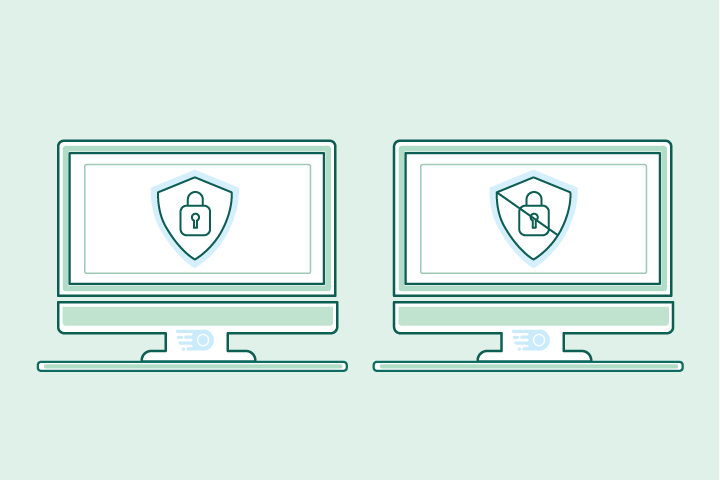The 5 Best (& Worst) Secure Web Browsers for Privacy [2025]

Table of Contents
HighSpeedOptions prides itself on providing honest, quality content. While we may be compensated when you make a purchase through links on our site, all opinions are our own. Here's how we make money.
You’ve searched to find the best internet providers near you, and found one that suits your needs. You’re happily binging shows on Netflix, working from home, and gaming online. But how safe are you browsing online? Cybercrimes are on the rise, and you should be mindful of cyber attacks and online traps.
A good starting point in your line of defense should be your web browser. With more personal data online than ever before, choosing a web browser that protects your information and maintains your privacy is key. To help keep you safe online, we put together a list of the best and worst web browsers for privacy. Let’s dive in.
5 Best Secure Browsers for Privacy
5 Least Secure Browsers for Privacy
Why Privacy Matters: The Risks of Not Using a Private Browser
Browsing today is not like what it used to be; your online activity is constantly being tracked, analyzed, and monetized. Without a private browser, you’re at risk of exposing your personal data to unwanted parties. Here’s why privacy should be a top concern when browsing the internet:
1. Data Tracking & Cookies
Every time you visit a website, data tracking technologies such as cookies collect information about your browsing habits. Cookies are small pieces of data stored on your device that help websites remember your preferences or login details. While they can improve your browsing experience, they also allow companies to track your every move online.
This means your personal information can be shared with advertisers, data brokers, and others without your consent.
2. Targeted Ads
Have you ever noticed that the ads you see online seem to be eerily relevant to your interests? That’s because your online activity is being monitored, and advertisers use this data to target you with personalized ads. While targeted ads may seem harmless, it’s a major invasion of privacy, as it’s based on extensive tracking of your behavior across multiple websites.
In fact, nearly 70% of online ads are personalized based on user data. Source: Statista.
3. Data Selling Concerns
Many popular browsers collect and sell your data to third parties. This data can include everything from your browsing history and search queries to your personal details like location and device type. Unfortunately, once your data is sold, you lose control over how it’s used—and this can lead to your information being sold again and again to different parties. If you have data selling concerns, using a private, secure browser is your best defense.
The Facebook-Cambridge Analytica scandal is a prime example of how personal data can be sold and misused for political manipulation.
4. Malicious Ads & Malware
Malicious ads (also known as “malvertising”) can infect your system with viruses, spyware, or ransomware. These ads are often disguised as legitimate content, making them difficult to spot. Without the proper protection, simply clicking on an ad can expose you to dangerous security threats.
Did you know that malvertising accounts for over 50% of all web-based cyberattacks?
By using a private browser, you can prevent much of this tracking, keep your information safe, and protect yourself from harmful online risks. The right browser will block unwanted cookies, protect against targeted ads, and stop malicious actors in their tracks.

The Best Web Browsers for Privacy

Mozilla Firefox
Firefox is one of the more popular secure browsers with frequent feature releases and updates. Some notable features include third-party cookie blocking, fingerprinter blocking, private browsing mode, individual protections report, breached website alerts, and a built-in password manager. The Mozilla Foundation is also a non-profit, so they have no incentive to sell personal data.
Pros
Open-source browser with frequent updates
Firefox’s privacy mode wipes all your information after logging off
Built-in password manager
Blocks third-party cookies and fingerprinting
Cons
Complex interface due to customization options
Fewer browser extensions and slower speeds

Tor
Tor, also known as The Onion Router, is a top browser for protecting yourself online from tracking and surveillance. Tor uses the software extension NoScript to wipe any prior web traffic to ensure the tracks of your browsing history are covered. They also use an in-house connection called onion routing, which has users connect to each other to access Tor’s server.
However, when accessing the dark web, it’s highly recommended that you also use a VPN to add an extra layer of protection. A VPN ensures that even if someone tries to track your traffic, they can’t see your real IP address, offering better overall security.
Pros
Hide your identity and access the dark web
Deletes all cookies automatically
Cons
Connection can be slow
May run into malware issues

Brave
Brave was founded in 2016 by Brendan Eich, creator of JavaScript, to ensure total privacy while browsing the internet. Brave has more built-in security features than both Safari and Chrome, including cross-site tracker blocking, no collection of IP addresses, and anonymized network routing (Tor mode). It even has an adblocker installed that can stop marketers from tracking your online activity.
Pros
Privacy-friendly ads that don’t sell user data
Rewards system that allows you to earn tokens
No user data collection
Cons
Fewer add-ons or plug-ins than other browsers
Can be challenging to exchange reward tokens for real money

DuckDuckGo
DuckDuckGo is a great browser for private mobile browsing. DuckDuckGo is predominantly a mobile browser, but it also has a desktop app and a Chrome extension. The Chrome extension is bundled with DuckDuckGo’s search engine, tracker blocker, and encryption enforcer. With its built-in ad-blocking and private search mode, DuckDuckGo ensures that your data is never compromised.
Pros
Does not store your IP address or user information
Easy-to-add extension
Cons
Visible ads in your searches
No protection against viruses, malware, ransomware, or unsafe sites

Epic
Epic is a private, secure web browser that blocks ads, trackers, fingerprinting, cryptomining, and more. Epic routes all web traffic through a proxy server that automatically blocks trackers and cookies. Using Epic ensures your data is encrypted and hidden from the government, Google, your employer, and hundreds of other data collectors.
Pros
Blocking tracking scripts and ads loads webpages up to 25% faster than other browsers
See who’s tracking you in other browsers and which trackers are blocked
Cons
Based on the Chromium code and isn’t open-source to the public
Not all features are easy to use
The Worst Web Browsers for Privacy

Google Chrome
It’s really no surprise that Google Chrome collects more user data than any other web browser. Google Chrome collects user and device IDs and links harvested data like browsing history, usage data, and locations to devices and individuals. Because Google makes money from selling ads, your activity is tracked and used for targeted advertising. However, the browser does have security features to protect you from malware and dangerous sites that could try to steal your passwords or infect your device.
Pros
Customizable settings and privacy control
Safety checks notify you if saved passwords have been compromised and flag dangerous extensions
Cons
User data used to sell targeted advertisements
Not transparent with their privacy policy

Yandex Browser
Yandex Browser is a Russian-based web browser made by web search company Yandex. Some notable security features from the bowser include DNS spoofing protection, DNSCrypt, and auto HTTPS support on insecure networks. Yandex Browser is available on most operating systems and works with Chrome extensions. However, Yandex is known for collecting personal data including phone number, age, email, search history, and more.
Pros
Protects you from malware and unsafe websites
Customizable security features and settings
Cons
Collects search queries and sends to main server for analysis
Not open source so no way to check code for what Yandex does in the background

Microsoft Edge
Microsoft Edge has a reputation of being one of the worst web browsers, probably due to being slow and unintuitive. According to a study done by researchers at Trinity College, Yandex and Edge are the two worst browsers for security. The study also found that Edge sends users’ hardware ID, IP address, and location to back-end servers which over time can reveal your identity.
Pros
Uses Microsoft Defender SmartScreen to protect against malicious websites
Option to choose from one of three tracking prevention levels
Cons
Collects data that can compromise your identity
Unintuitive user interface

Baidu
Baidu is a Chinese-owned and Chromium-based internet browser (uses the same engine that powers Chrome). This web browser is no stranger to controversy, as the Baidu mobile app was kicked out of Google Play last year for leaking data that left users trackable. Privacy issues aside, Baidu does have some decent security features including a built-in virus scanner, ad blocker, and the ability to block third-party software from changing your existing security and privacy settings.
Pros
Familiar and easy-to-use interface
Built-in virus scanner prevents you from downloading harmful files or visiting malicious sites
Cons
Previous data leaks that put users at risk
Installs additional programs

Apple Safari
Safari is Apple’s default web browser. Safari does collect browsing history, usage data, and locations, but unlike Chrome, they claim to not link data back to individuals and devices. If you’re able to overlook the data collection, Safari does a decent job at preventing viruses and malicious sites from infecting your entire system. If you click on a bad link, Safari will protect your data.
Pros
Prevents you from loading suspicious sites
Prevents trackers from using your information
Cons
Infrequent updates
Not an open-source browser
Browser Extensions to Enhance Your Privacy
In addition to using a private browser, you can further improve your privacy by installing privacy-focused browser extensions. These tools block trackers, prevent unwanted ads, and keep your data safe while you browse.
Here are a few recommended extensions to enhance your privacy:
- uBlock Origin: An efficient ad-blocker that also blocks third-party trackers. We recommend using this plugin with Firefox, but it’s also available on other browsers.
- Privacy Badger: A tool developed by the Electronic Frontier Foundation that automatically blocks invisible trackers.
- HTTPS Everywhere: Ensures that you connect to websites using HTTPS encryption, keeping your browsing secure.
Stay Safe Online with Better Privacy Protection
Ready to take control of your online privacy? Start by choosing a browser that prioritizes security, and consider adding extensions like uBlock Origin and Privacy Badger for extra protection. For even more security, consider using a VPN to encrypt your internet traffic and hide your IP address.
Take action now—protect your personal data and keep your online experience safe. Want to learn more about online safety for your family? Check out our Guide to Parental Controls & Online Safety.





